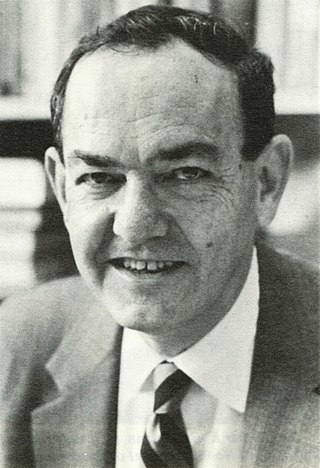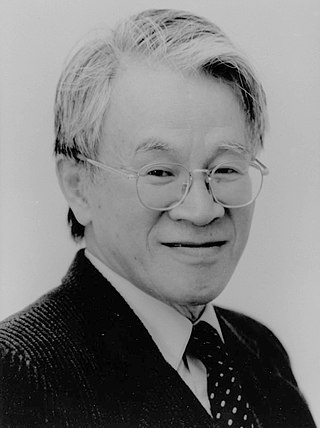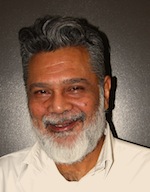
Herbert Alexander Simon was an American political scientist whose work also influenced the fields of computer science, economics, and cognitive psychology. His primary research interest was decision-making within organizations and he is best known for the theories of "bounded rationality" and "satisficing". He received the Nobel Memorial Prize in Economic Sciences in 1978 and the Turing Award in computer science in 1975. His research was noted for its interdisciplinary nature, spanning the fields of cognitive science, computer science, public administration, management, and political science. He was at Carnegie Mellon University for most of his career, from 1949 to 2001, where he helped found the Carnegie Mellon School of Computer Science, one of the first such departments in the world.

Kenneth Joseph Arrow was an American economist, mathematician, writer, and political theorist. Along with John Hicks, he won the Nobel Memorial Prize in Economic Sciences in 1972.

Gérard Debreu was a French-born economist and mathematician. Best known as a professor of economics at the University of California, Berkeley, where he began work in 1962, he won the 1983 Nobel Memorial Prize in Economic Sciences.
In decision theory, subjective expected utility is the attractiveness of an economic opportunity as perceived by a decision-maker in the presence of risk. Characterizing the behavior of decision-makers as using subjective expected utility was promoted and axiomatized by L. J. Savage in 1954 following previous work by Ramsey and von Neumann. The theory of subjective expected utility combines two subjective concepts: first, a personal utility function, and second a personal probability distribution.

Harold Hotelling was an American mathematical statistician and an influential economic theorist, known for Hotelling's law, Hotelling's lemma, and Hotelling's rule in economics, as well as Hotelling's T-squared distribution in statistics. He also developed and named the principal component analysis method widely used in finance, statistics and computer science.

Michio Morishima was a Japanese heterodox economist and public intellectual who was the Sir John Hicks Professor of Economics at the London School of Economics from 1970 to 1988. He was also professor at Osaka University and member of the British Academy. In 1976 he won the Order of Culture.
The Allais paradox is a choice problem designed by Maurice Allais to show an inconsistency of actual observed choices with the predictions of expected utility theory. Rather than adhering to rationality, the Allais paradox proves that individuals rarely make rational decisions consistently when required to do so immediately. The independence axiom of expected utility theory, which requires that the preferences of an individual should not change when altering two lotteries by equal proportions, was proven to be violated by the paradox.

Jacob Marschak was an American economist.

Leonid Hurwicz was a Polish–American economist and mathematician, known for his work in game theory and mechanism design. He originated the concept of incentive compatibility, and showed how desired outcomes can be achieved by using incentive compatible mechanism design. Hurwicz shared the 2007 Nobel Memorial Prize in Economic Sciences for his seminal work on mechanism design. Hurwicz was one of the oldest Nobel Laureates, having received the prize at the age of 90.

Pradeep Dubey is an Indian game theorist. He is a Professor of Economics at the State University of New York, Stony Brook, and a member of the Stony Brook Center for Game Theory. He also holds a visiting position at Cowles Foundation, Yale University. He did his schooling at the St. Columba's School, Delhi. He received his Ph.D. in applied mathematics from Cornell University and B.Sc. from the University of Delhi. His research areas of interest are game theory and mathematical economics. He has published, among others, in Econometrica, Games and Economic Behavior, Journal of Economic Theory, and Quarterly Journal of Economics. He is a Fellow of The Econometric Society, ACM Fellow and a member of the council of the Game Theory Society.

Alvin Eliot Roth is an American academic. He is the Craig and Susan McCaw professor of economics at Stanford University and the Gund professor of economics and business administration emeritus at Harvard University. He was President of the American Economic Association in 2017.

Teck-Hua Ho is the fifth president of the Nanyang Technological University, Singapore (NTU). He is also a Distinguished University Professor at NTU Singapore. Prior to joining NTU, he was the senior deputy president and provost at the National University of Singapore (NUS), and the William Halford Jr. Family Professor of Marketing at the Haas School of Business. He is also the founding executive chairman of AI Singapore, a national research and development programme.

Ehud Kalai is a prominent Israeli American game theorist and mathematical economist known for his contributions to the field of game theory and its interface with economics, social choice, computer science and operations research. He was the James J. O’Connor Distinguished Professor of Decision and Game Sciences at Northwestern University, 1975–2017, and currently is a Professor Emeritus of Managerial Economics and Decision Sciences.
David Schmeidler was an Israeli mathematician and economic theorist. He was a Professor Emeritus at Tel Aviv University and the Ohio State University.
Drew Fudenberg is a Professor of Economics at MIT. His extensive research spans many aspects of game theory, including equilibrium theory, learning in games, evolutionary game theory, and many applications to other fields. Fudenberg was also one of the first to apply game theoretic analysis in industrial organization, bargaining theory, and contract theory. He has also authored papers on repeated games, reputation effects, and behavioral economics.
Edi Karni is an Israeli born American economist and decision theorist. Karni is the Scott and Barbara Black Professor of Economics at Johns Hopkins University. He is a Fellow of the Econometric Society and an Economic Theory Fellow of the Society for the Advancement of Economic Theory.
Larry G. Epstein is a Canadian economist who is currently Professor of Economics at McGill University. He is a Fellow of the Canadian Economics Association and Econometric Society. He was also Fellow of the Royal Society of Canada before moving to the United States.
Vincent P. Crawford is an American economist. He is a senior research fellow at the University of Oxford, following his tenure as Drummond Professor of Political Economy from 2010 to 2020. He is also research professor at the University of California, San Diego.

Aldo Rustichini is an Italian-born American economist, academic and researcher. He is a professor of economics at University of Minnesota, where is also associated with the Interdisciplinary Center for Cognitive Sciences.














